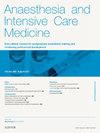Challenges in healthcare delivery in low- and middle-income countries
IF 0.3
Q4 ANESTHESIOLOGY
引用次数: 0
Abstract
The Lancet Commission outlines a vision of universal access to safe emergency and essential surgery. Global disparities in perioperative outcomes are recognized, with resource-poor environments and a workforce crisis particularly challenging low- and middle-income countries (LMICs) to provide safe surgical and anaesthesia care. The coronavirus disease (COVID-19) pandemic placed an even greater strain on under-resourced and over-stretched healthcare systems. Bridging the gap to achieve universal access is a substantial undertaking and requires collaboration with high-income countries. Global partnerships are abundant and mutually beneficial, aiming to alleviate the workforce crisis, provide education, training and expertise and raise standards of care in host LMICs. Clinical, leadership and management experience gained in low-resource settings is valued by healthcare systems in high-income countries, acknowledged by curriculum for ‘developing world anaesthesia’. Further challenges to healthcare delivery, training and implementation of change are influence by government policy, cultural traditions, expectations and work ethic. During the COVID-19 pandemic many partnerships were required to move online. The necessity of providing remote support has created its own set of challenges, while also providing novel opportunities for education and collaboration with the global health community. This article describes challenges through reflection on personal experience in Zambia.
低收入和中等收入国家卫生保健服务面临的挑战
《柳叶刀》委员会概述了普遍获得安全急诊和基本手术的愿景。人们认识到全球围手术期结果的差异,资源贫乏的环境和劳动力危机对低收入和中等收入国家(LMICs)提供安全的手术和麻醉护理尤其具有挑战性。冠状病毒病(COVID-19)大流行给资源不足和过度紧张的医疗保健系统带来了更大的压力。弥合差距以实现普遍可及是一项艰巨的任务,需要与高收入国家合作。全球伙伴关系丰富且互利,旨在缓解劳动力危机,提供教育、培训和专业知识,并提高东道国中低收入国家的护理标准。高收入国家的卫生保健系统重视在低资源环境中获得的临床、领导和管理经验,“发展中国家麻醉”课程也承认这一点。政府政策、文化传统、期望和职业道德对医疗保健服务、培训和变革实施的进一步挑战。在2019冠状病毒病大流行期间,许多伙伴关系被要求转移到网上。提供远程支助的必要性带来了一系列挑战,同时也为教育和与全球卫生界的合作提供了新的机会。这篇文章通过反思在赞比亚的个人经历来描述挑战。
本文章由计算机程序翻译,如有差异,请以英文原文为准。
求助全文
约1分钟内获得全文
求助全文
来源期刊

Anaesthesia and Intensive Care Medicine
ANESTHESIOLOGY-
CiteScore
0.50
自引率
0.00%
发文量
152
期刊介绍:
Anaesthesia and Intensive Care Medicine, an invaluable source of up-to-date information, with the curriculum of both the Primary and Final FRCA examinations covered over a three-year cycle. Published monthly this ever-updating text book will be an invaluable source for both trainee and experienced anaesthetists. The enthusiastic editorial board, under the guidance of two eminent and experienced series editors, ensures Anaesthesia and Intensive Care Medicine covers all the key topics in a comprehensive and authoritative manner. Articles now include learning objectives and eash issue features MCQs, facilitating self-directed learning and enabling readers at all levels to test their knowledge. Each issue is divided between basic scientific and clinical sections. The basic science articles include anatomy, physiology, pharmacology, physics and clinical measurement, while the clinical sections cover anaesthetic agents and techniques, assessment and perioperative management. Further sections cover audit, trials, statistics, ethical and legal medicine, and the management of acute and chronic pain.
 求助内容:
求助内容: 应助结果提醒方式:
应助结果提醒方式:


